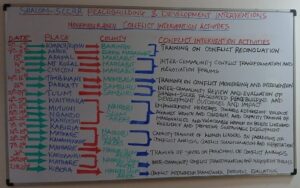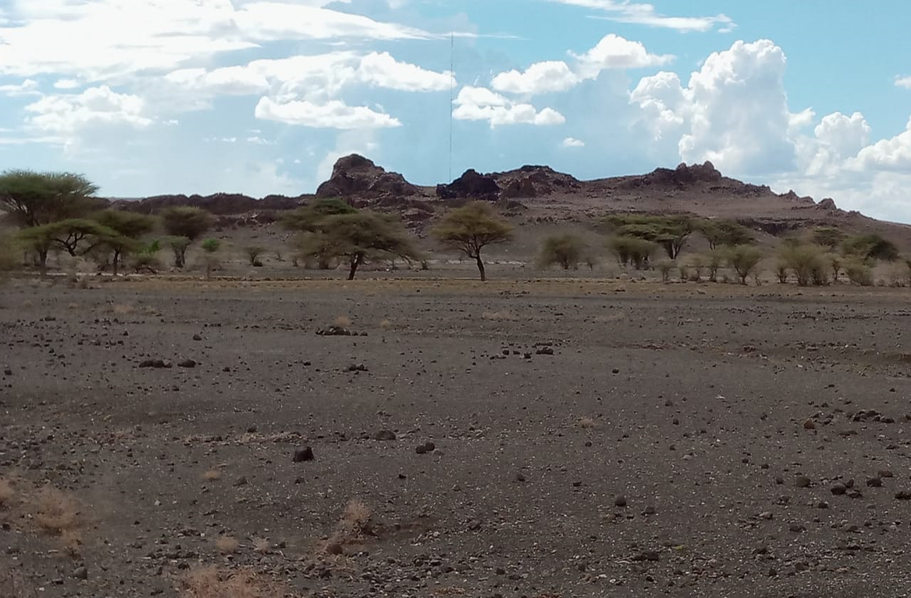
Kaemanik, one of the contested dry and hostile borderline between the pastoralists Turkana and Pokot communities
Shalom empowers 21 vulnerable communities living along Turkana – West Pokot conflict borderline with knowledge and analytical skills on managing natural resource-based conflicts. The project is directly engaging over 2,000 beneficiaries and 20,000 indirect beneficiaries. 4 Natural resource use and management proposals have been drafted and reviewed by target communities in all the project areas.
This NRM (Natural Resource Management) Project is implemented in 5 phases which include: Problem identification with target communities through research; community entry, trust building and mobilization; capacity building of communities through trainings; development of natural resource use and management proposals; and, coalition building and engagement with the leadership of Turkana and West Pokot counties.
The Turkana and West Pokot Counties share one of the longest borderlines in Kenya. The borderline is predominantly inhabited by pastoralists from both Turkana and Pokot communities who are locked in a protracted bloody inter-ethnic conflict majorly caused by competition over access to and control of natural resources mainly water, pasture and land (that is now valued because of the presence of oil and precious minerals). This conflict has resulted to loss of many lives, injuries, massive loss of livestock, displacement of people, increased hatred between the two communities, disruption of socio-economic activities and livelihood systems, low investment and reduced economic activities in the region, destruction and closure of education and health facilities, stalled development projects, high level of starvation and environmental degradation along with threat to water catchment areas. Moreover, most agro-pastoral communities cannot access large areas of pasture, water and fertile agricultural lands. This further hinders the mobility of migratory herders which is a crucial drought coping mechanism. According to Lokitare Korinyang’, a reformed warrior and currently serving as a National Police Reservist in Lokitonyala sub-location, “there are innumerable effects of inter-ethnic conflict between us the Pokot community and our neighbours, the Turkana people. However, the effects of this conflict cannot be quantified in terms of psychological traumas we have suffered over the deaths and injuries of our people, injured social relationships between the communities, and lost livelihoods…”
For many years, the two communities have been conflicting over access to water and pasture. However, with the discovery of other valuable resources like oil and gold, there is now increased interest over land and boundary demarcations. Moreover, the emergence of the County governance, despite bringing many valuable services closer to the people, has also influenced communities’ perceptions on governance and ownership of resources within the established political and administrative boundaries consequently causing new and more complex conflicts.
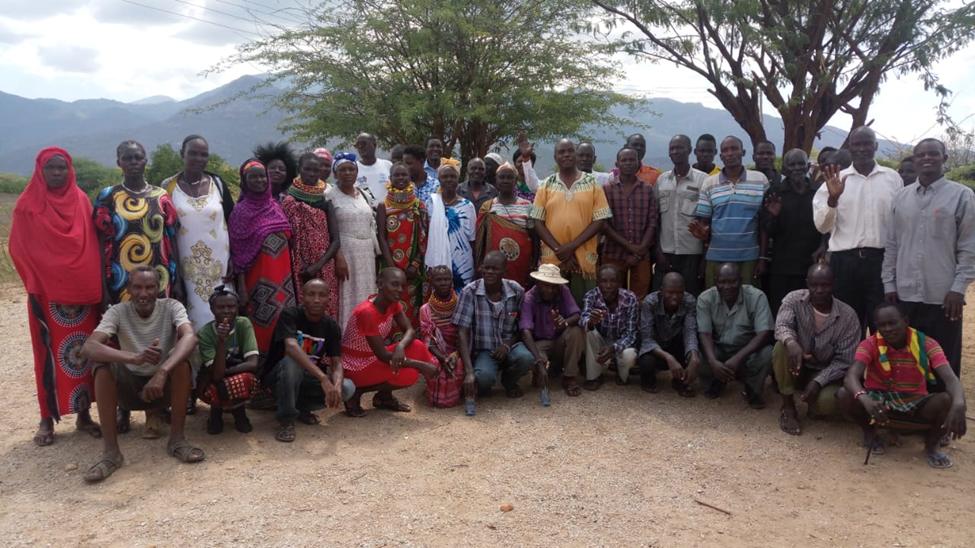
Village/chiefs’ elders, religious leaders, security agents, kraal leaders, women leaders, youth leaders and peace committee leaders after a community awareness forum facilitated by Shalom in Kainuk, Turkana County
The true picture of this new dynamic of the conflict is clearly depicted by the Lorogon siege in 2013 where more than 200 heavily armed raiders from the neighbouring Pokot community surrounded the Turkana villages of Lorogon, Nakwamoru, Juluk and Kapelibok for close to a week. The situation was “sparked by the recent release of a map that placed River Turkwel in Turkana County… According to the raiders, the map should place the river in West Pokot Count.” Mr. Elijah Kodoh, the then County Commissioner of Turkana South argued. Moreover, the Kerio Valley Development Authority (KVDA) wanted to start a sugarcane plantation along the river, but the Pokot Community was against the project because the map had placed the river in Turkana County. “My memory is still very fresh when our village was under siege for a week. During the siege, over 1,000 people had little to survive on… actually we had no food, no water, no going to school for our kids and sounds of guns for hours and days was ‘music’ to our ears. Some of us were injured but we could not access any medical services… Look at my hand… this is a bullet scar.” Mr. Gabriel Kerio, a catholic catechist from Lorogon village painfully narrated to the Shalom team. “We were not able to access any help from anywhere since the only road to and from this area was blocked after the raiders felled trees across it at various points and dug trenches to make it impassable.” added Gabriel.
With the background of the negative impact of conflict in this area, SCCRR is engaging Turkana and West Pokot communities into a process where they can be able to peacefully manage natural resource-based conflicts. SCCRR in partnership with Trocaire works towards empowering vulnerable communities in Turkana – West Pokot by increasing their awareness on resource rights and management of natural resource-based conflicts through Natural Resource Management (NRM) Project. This ensures that those in need have access to, control over and ability to effectively protect and utilise critical resources, in particular land, water and grass.
In the design of the NRM project in Turkana – West Pokot conflict borderline, SCCRR has ensured that the process is participatory by providing space for the target communities to be proactively involved in identifying the conflict issues, natural resources associated with conflict in their areas (and the effects of conflict caused by the competition over access and control of these natural resources), and ultimately to draw the Natural resource and management plans.
From the problem analysis done by SCCRR together with the target communities, the following are the gaps that SCCRR’s Natural Resource Management Project will be addressing in this area: insufficient capacity in the communities mainly in regards to the prevention and management of their own conflicts hence the persistence of the conflict; ineffective ways of managing natural resources as confirmed by the continuous struggle over access to and control of these vital resources particularly water, pasture and land; and, lack of women involvement in peacebuilding processes and yet they are key stakeholders since some are perpetrators, victims or possible peace agents.
Through the implementation of NRM project so far, 21 communities have mapped natural resources found in their areas and are now aware of those resources that are associated with conflict in their localities. Furthermore, these communities were able to identify how the natural resource-based conflicts have negatively affected inter-community relations, disrupted socio-economic activities and livelihoods in their areas. “We now know the kind of natural resources embedded in our land particularly those that makes us fight with our neighbouring communities… We are grateful to Shalom for opening up our eyes to see the relationship between these resources and persistent conflict that we have been experiencing with our neighbouring brothers and sisters from Turkana community.” commented Chepolukomomg’ Lokitare, a woman leader from Nauyapong’ area in West Pokot.
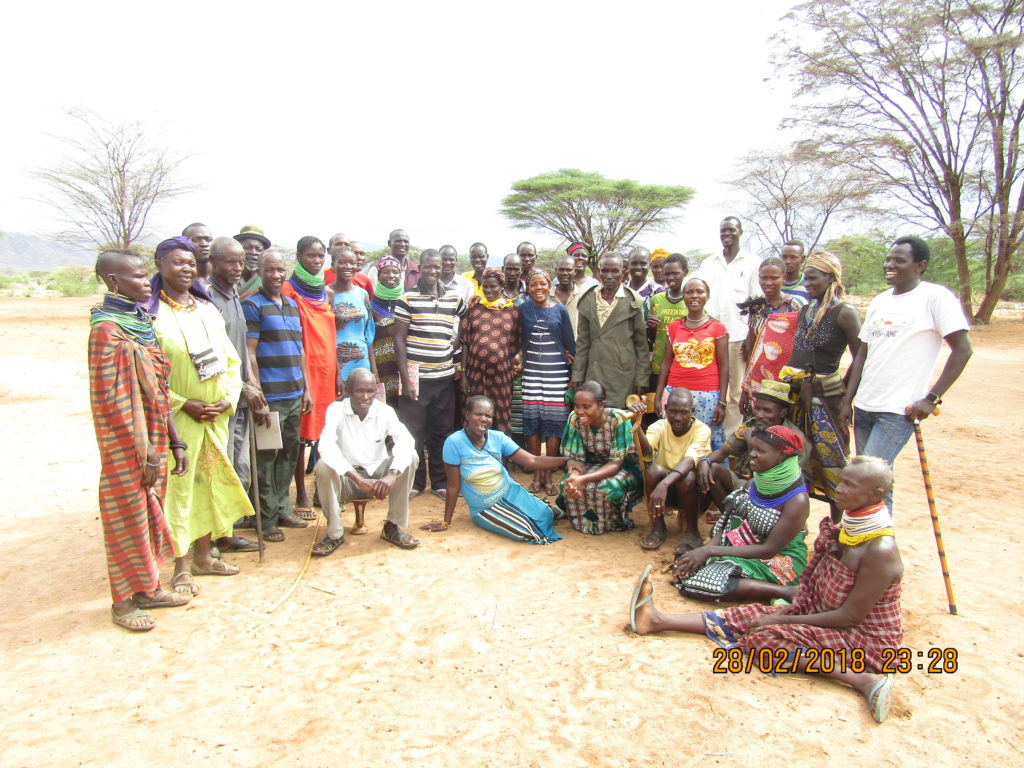
Shalom’s NRM Committee in Loreng’ekipi after the training on managing natural resource-based conflicts
171 members of Shalom’s Natural Resource Management (NRM) committees have been equipped with knowledge and analytical skills of managing natural resource-based conflicts leading them to drafting of natural resource use and management proposals in their areas. The NRM Committees both in Turkana and West Pokot involved in local conflict early warning structures hence contributing in the prevention of looming conflicts.
The members are also participating in inter-community meetings and in the drafting of peace agreement between the two pastoralist communities in Lokitonyala and Loreng’ekipi areas.
61 Shalom’s community facilitators drawn from NRM Committees have been equipped with community facilitation skills and are engaging their communities through community awareness creation forums on the effective management of natural resource-based conflicts. They have also spearheaded the review of the drafted natural resource use and management proposals by the target communities. According to John Ekal, a Kraal Peace Committee in Loreng’ekipi in Turkana, “the knowledge and skills that we have acquired through the trainings conducted by Shalom enabled us to draft natural resource use and management proposal as well as engage our community members in different forums on issues surrounding the management of natural resource-based conflicts… I am now a better community facilitator because of Shalom.”
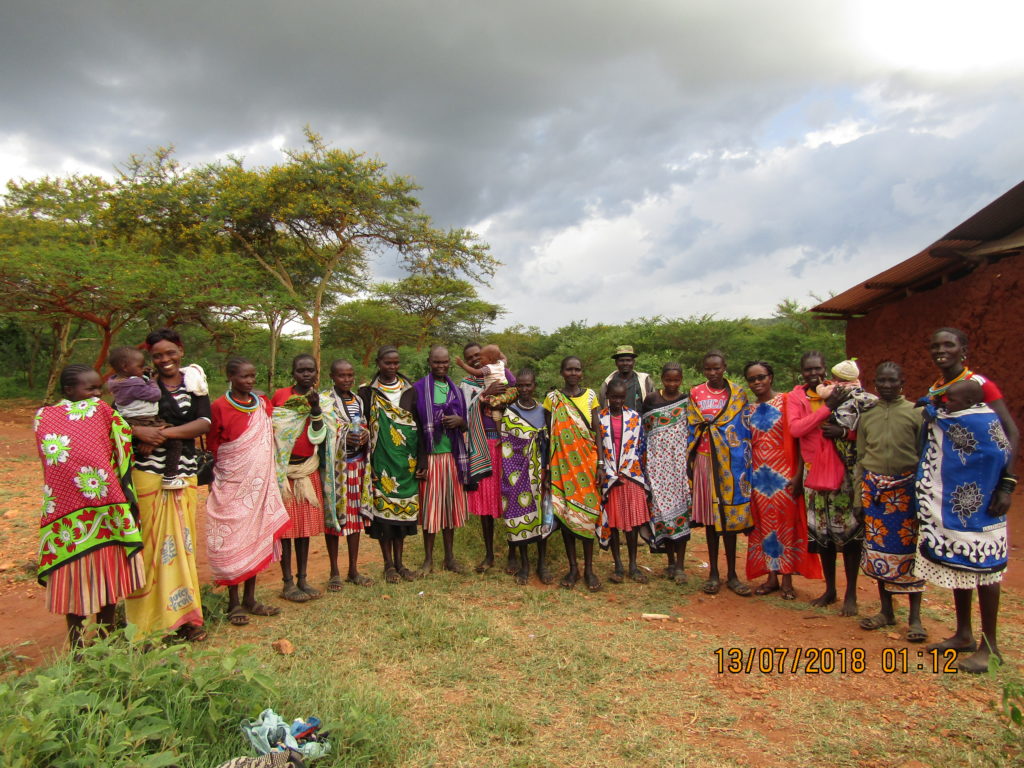
Shalom trained West Pokot’s women leaders in Lokitonyala pose for a photo after the training
Over 50 women involved in the project as members of NRM Committees across the project areas and approximately 500 women participated during community awareness creation forums conducted by Shalom’s community facilitators. “Thank you Shalom for considering us women and giving us opportunity to participate in peacebuilding processes that were previously preserved only for our men counterparts. We appreciate your good work of making our men understand that sustainable peace can be cultivated and nurtured if all of us work together.” said Chepocheyech Long’olemwai, a woman leader from Turkwel Gorge area in West Pokot.
In the next phases of this project, Shalom plans to empower these communities with knowledge and skills on inter-community dialogue with greater focus on the prevention and management of natural resource-based conflicts. This is meant to give them skills that will enable them to participate peacefully in inter-community dialogue meetings in order to develop 2 joint-natural resource use and management plans for pastoralist communities in Loreng’ekippi – Nauypong’ and Kainuk – Turkwel Gorge areas. After this has been done, Shalom will hold meetings with the county governments of Turkana and West Pokot, and other relevant stakeholders to discuss the natural resource use and management plans developed and jointly endorsed by the pastoralist communities living in Turkana-Pokot conflict borderline. Finally, the Shalom’s NRM Committees will spearhead the implementation of joint-natural resource use and management plans at the community level.
By:
Paulson Tadeo Erot, M.A., Assistant Program Manager, Peacebuilding Program
Francis Mwangi, M.A., Head of Monitoring and Evaluation Department, SCCRR

